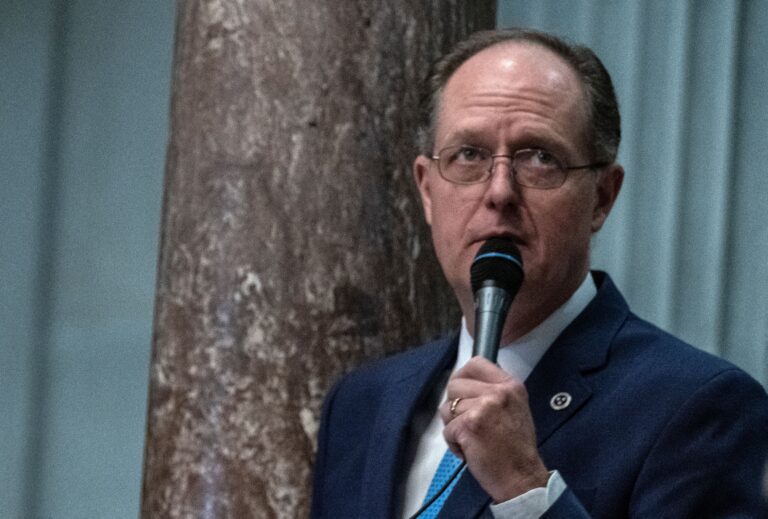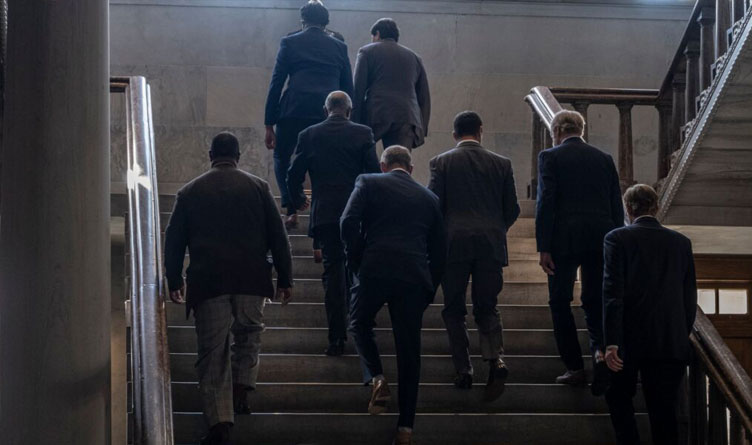Photo: Legislators heading upstairs in the Capitol. Photo Credit: John Partipilo
By Sam Stockard [The Tennessee Lookout CC BY-NC-ND 4.0] –
Ford Motor Co. might have been satisfied with last-minute changes inserted in COVID-19 legislation last week, but two major business groups are upset with the haste of the special session and legislation that could put companies at risk of being sued.
The National Federation of Independent Business and Tennessee Business Roundtable both made harsh critiques this week in the aftermath of the three-day session that ended early Saturday morning after hours of work to amend key bills.
In addition, Democrats called on Gov. Bill Lee on Tuesday to veto four of the bills passed last week. Lee is non-committal so far, saying he is reviewing the legislation.
Business groups are having no trouble voicing their opposition, but it’s unclear whether that will have an impact on Lee’s decision.
“We’re disappointed in the overall process. We’re disappointed that the legislation was rushed so quickly without public comment, with only a few exceptions. And we’re hopeful the General Assembly will be more transparent during extraordinary sessions going forward,” said Jim Brown, state director for the National Federation of Independent Business.

Brown lobbied the Legislature against enacting a vaccine passport, but Republicans lawmakers persisted and wound up passing legislation that creates a “cause of action” for companies to be sued by employees if they try to enforce vaccine requirements.
Except for a few of its leaders, Brown said NFIB’s members didn’t have enough time to “engage” with legislators last Friday and early Saturday morning when lawmakers wrapped up their special session, which dealt mainly with COVID-19 but also created the potential for partisan county school board elections and replacement of district attorneys general who refuse to enforce certain areas of state law.
NFIB plans to “score” lawmakers’ votes on the COVID-19 bill they passed after legislators worked out a compromise in Senate and House bills.
In a statement to the Tennessee Lookout, Tennessee Business Roundtable President Pat Sheehy said the omnibus bill the Legislature passed pushes most Tennessee employers into a “don’t ask, don’t tell” posture on employee vaccinations.
The legislation would allow employers to require them to protect employees, customers and business partners but not ask whether employees or applicants have received the vaccine. It also would prevent companies from placing any consequences on individuals’ decisions, making vaccine requirements “practically ineffective in protecting Tennesseans from COVID-19 in most places of businesses,” the Tennessee Business Roundtable said.
Furthermore, until the federal OSHA releases its emergency standard on vaccines as part of President Joe Biden’s vaccine mandate, most employers in the state won’t have “clarity” on what they’re required to do or “whether or how they can comply with conflicting federal and state requirements, the Business Roundtable said.
“That sort of uncertainty is not business-friendly—it frustrates business planning and increases the likelihood that business operators could be fined or sued if they make erroneous compliance decisions,” the statement from the Business Roundtable says.
House Speaker Cameron Sexton, the principal player in calling the special session, pointed out Tuesday the special session’s length was similar to other special sessions over the last decade, three days, according to spokesman Doug Kufner. He also noted NFIB didn’t notify the Speaker’s Office about testifying in the weeks leading up to the special session.
“It is our understanding the NFIB did send mass emails, text messages and called members directly,” Kufner said in a statement. “Members of the General Assembly stood strong to protect the individual freedoms of Tennesseans while also providing a layer of protections for Tennessee businesses from unconstitutional federal mandates.”
Lt. Gov. Randy McNally did not respond to questions by Tuesday evening.
Several Republican lawmakers cited calls from constituents who said they’d been fired for refusing to get the vaccine.
While the Legislature reversed course and opted against prohibiting mask mandates for private businesses, it left language in the legislation prohibiting vaccine passports, which is one of NFIB’s biggest concerns. An omnibus bill also allowed employees fired for refusing the vaccine to apply for unemployment.
I think what the Biden Administration has proposed as far as a vaccine mandate from OSHA is government overreach . . . But to me the appropriate response is less regulation not more. – Rep. Michael Curcio, R-Dickson, on GOP legislation
Oddly enough, NFIB supported an amendment by Democratic Sen. Jeff Yarbro to remove the private right of action from the COVID-19 omnibus bill. The measure failed 24-6 with Republicans voting in lock step to kill it.
Under the legislation that wound up passing, businesses such as Bridgestone Arena and Ryman Auditorium cannot ask fans or concert-goers for proof of vaccine, though they can request negative tests.
But if a company does require a vaccine passport and tries to compel an employee or visitor to show proof, they could face a lawsuit.
State Rep. Michael Curcio was among the Republican House members who voted against the legislation that came back from a conference committee and passed 58-22.
Curcio, chairman of the House Criminal Justice Committee from Dickson, points out he ran for office on a “pro-business” Republican platform.
“I think what the Biden Administration has proposed as far as a vaccine mandate from OSHA is government overreach. You’re not gonna find anybody madder about it than I am,” Curcio said. “But to me the appropriate response is less regulation, not more.”
Telling Tennessee businesses “what they can and can’t do” is the wrong step, because it creates uncertainty and could lead to other restrictions, Curcio said.
Curcio noted the legislation creates a private right of action for compensatory damages and reasonable attorney fees, but not for economic or punitive damages.
Technically, it’s not illegal for businesses to have a vaccine mandate but enforcing it would violate the law, he said.
Staying Ford friendly
Around mid-Friday, senators got word that Ford was not happy with the legislation, mainly the piece prohibiting companies from requiring workers to wear masks. It raised questions about whether Republican lawmakers could be jeopardizing Ford’s plan to invest $5.6 billion for a Ford electric truck and battery plant where 5,800 people are to be hired at the Memphis Regional Megasite.
Sen. Ed Jackson, a Jackson Republican, carried the legislation that provided a $900 million incentive package for Ford Motor Co. to locate at the megasite in Haywood County about 40 miles from downtown Memphis.
Business groups have signaled a growing gap between the legislature and the business community. “The special session and this legislation should be a huge wake-up call for Tennessee business overall,” the Tennessee Business Roundtable said in a statement. “Increasingly, significant policy concerns shared by our state’s broader business community seem to be brushed aside when they’re deemed politically inconvenient.”
Jackson was among those receiving word from Ford on Friday that the company was “very concerned” about the mask prohibition in the legislation sponsored by Speaker Sexton and Lt. Gov. McNally.
That created a turning point of sorts for the special session as lawmakers started working on new language that could survive Ford’s complaint and still satisfy constituents.
Jackson said Tuesday he has not heard back from the company since the Legislature removed the mask prohibition for private companies from the legislation.

“I’m pretty sure I would have had something not gone their way. But I think they addressed the issues they had with the masks,” Jackson said.
The main mask prohibition remaining in the bill prohibits local school districts from requiring students to wear masks, even though some systems contend that has helped them fight the pandemic.
Several school districts shut down in August because of the spread of the Delta variant. Nearly 20 school personnel statewide have died from the disease since school started this fall.
Yarbro, who calls the special session a “bad idea from the inception,” raised the biggest fuss against the prohibition on schools. School districts can mandate masks only in severe situations and then only one school at a time for 14 days.
He contends the special session also was rushed and executed in “a haphazard way that will have some … negative consequences for the state.”
On the Senate floor, Yarbro called the undertaking “reckless” during debate early Saturday and was immediately dressed down by Senate Majority Leader Jack Johnson, a Franklin Republican, who a day earlier admitted the legislation veers from the “tenets” of Republican philosophy. Johnson argued that Yarbro shouldn’t criticize the hard work lawmakers put in to pass the COVID-19 omnibus bill and answer concerns raised by their voters.
Yarbro, however, said Tuesday the legislation “serves little purpose other than to placate the loudest, most extreme voices in our state.”
But while lawmakers might have been listening to anti-vaccine and anti-mask zealots back home, apparently they weren’t paying close attention to the business community.
“The special session and this legislation should be a huge wake-up call for Tennessee business overall,” the Tennessee Business Roundtable said. “It’s revealing that objections by our state’s existing businesses to proposed mask-mandate bans were mostly ignored until our state’s newest, largest business investor weighed in against them.”
The Business Roundtable signaled that the Legislature may not be paying close enough attention anymore, creating a gap between lawmakers and the business community.
“Increasingly, significant policy concerns shared by our state’s broader business community seem to be brushed aside when they’re deemed politically inconvenient. Individual businesses and sectors sometimes muster the political will and resources to mitigate or deal themselves out of potentially detrimental proposals, but until more business leaders re-commit to empowering our broad-based organizations to advocate for all Tennessee businesses, we won’t win on issues like this, and Tennessee’s business climate will begin to suffer,” the group said.
Ford Motor Co. officials contacted Gov. Lee’s Office Friday and were told to call legislators.
Lee has been largely quiet about the special session, saying only that he and legislators had similar concerns about Biden’s vaccine mandate. He commended lawmakers for their response to constituents’ concerns.
The bills reached his desk Tuesday, yet he says he is still reviewing them before committing to signing. If he doesn’t sign them, they could take effect automatically. Lee has never vetoed a bill.
Asked if he was ever worried the Legislature was on the verge of killing the Ford deal, Lee said Monday, “I think that Tennesseans should weigh in any time, individuals, business owners, people who are involved in companies, certainly should weigh in and that’s how that process works. So I welcome input from folks.”
Meanwhile, the governor’s executive order allowing parents to opt children out of school mask mandates expires Friday. He declined to say Monday whether he would renew that order, which has been turned back in four federal court decisions.
Lee noted the Legislature’s bills could affect the order and his decision.

Sam Stockard is a veteran Tennessee reporter and editor, having written for the Daily News Journal in Murfreesboro, where he served as lead editor when the paper won an award for being the state’s best Sunday newspaper two years in a row. He has led the Capitol Hill bureau for The Daily Memphian. His awards include Best Single Editorial from the Tennessee Press Association. You can contact Stockard at sstockard@tennesseelookout.com.




3 Responses
There again, If you want to wear a mask wear it, if you want a shot, get it!!! We are all adults and are perfectly capable to make adult decisions for ourselves and our children. We don’t need our employers, big business, or big government protecting us from ourselves. Stop with the big daddy syndrome and get over yourselves. Thank you, Tennessee for keeping our freedoms intact.
I agree with Peaches; above. In addition, Parents (or persons that have responsibility for minors) shall have the responsibility and authority to make same decisions for their children. Not just in response for Covid related decisions.
“but two major business groups are upset with the haste of the special session and legislation that could put companies at risk of being sued.”
Corporations and business entities need to STOP legislating our health!!! What we put into our bodies is OUR business and No One Else’s! If they want the authority to Force employees to get the vaccine then they Need to be liable for Any and All ill effects as a result!! It’s only fair, they can’t have it both ways!!! Pay up or Shut Up!!!!!
I have an Associate Degree in Business Management w/ Human Resources Minor!